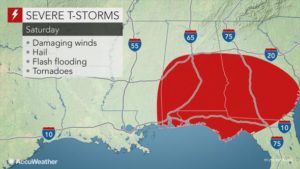Beware of Repair Scams in the Aftermath of Storms

An EF-2 tornado hit parts of southern Georgia with winds that reached up to 135 mph.
Recent storms that swept across South Georgia killed 15 people and caused massive damage to homes and businesses. According to the National Weather Service an EF-2 tornado hit parts of southern Georgia with winds that reached up to 135 mph.
Unfortunately the damage may not end with the storms. The Better Business Bureau (BBB) in Georgia is warning residents to be aware of potential repair scams that often take place after major storms. Less than honest contractors often turn up in areas where recent storms have caused major damage and homeowners are looking to repair their homes quickly.
If your house has been damaged due to the recent storms you should contact your insurance company as soon as it is safe. Here are a few tips on for reporting a claim to your insurance company:
- Take Photos: You should take photos and video of the damage as soon as it is safe to return to your house. Be sure to take numerous pictures from a variety of different angles and make sure you document all of the damage. These photos should be submitted to your insurance adjuster.
- Cover Any Damage: If your home is severely damage and there are areas that are open to the elements such as a hole in the roof, or broken windows you should do your best to cover up the opening to prevent further damage. In some cases, insurance companies will not pay for damage that occurred after the initial damage caused by the storm if you don’t take reasonable steps to prevent further damage.
- Do an Inventory: As soon as it is safe, make an inventory of all the damaged items in your home. If possible include photos, receipts and date of purchase of your damaged or destroyed items. Make sure your inventory is as complete as possible to ensure you are reimbursed in full for your lost possessions.
- Keep Receipts: Keep all receipts for temporary lodging, food and any other expenses that may be covered by your homeowners insurance policy. Your adjuster will want to see these receipts when processing your claim.
Don’t Let Yourself Be Scammed
While you will probably want to get your home fixed as soon as possible, especially if it is severely damaged, don’t let yourself be scammed by dishonest contractors.
Following are tips being offered by the BBB to avoid being the victim of a contractor scam:
Don’t Get Emotional: While you may be anxious to get your home repaired, do not make emotional decisions or be pressured into committing to a specific contractor. It is better to make temporary repairs and find a reputable contractor than being pressured into signing with a less than honest builder.
Shop Around: Always get a number of bids before deciding on a contractor. Experts recommend getting at least three competitive bids. Check references and make sure the contractor is properly insured, licensed and bonded.
Be Aware: It is best to avoid contractors going door to door who claim they are working on a project down the street and want to offer you a discount. If you decide to listen to their pitch, ask to see their solicitation permit and check references as well as verifying they are licensed, insured and bonded.
Written Agreement: Always require a written contract with anyone you end up hiring. The contract should spell out all the work to be done, the type of materials to be used as well as a cost breakdown of both labor and materials. The contract should also detail any warranties or guarantees on materials and labor. A start and finish date should be specified in the contract.
Ask for Insurance Certificate: Request a copy of the contractor’s current insurance certificate and make sure it covers Workmen’s Compensation, property damage as well as personal liability.
Pulling Permits: The person that pulls a permit is responsible for ensuring that the work meets state and local codes so make sure your contractor is responsible for pulling all necessary permits. If they ask you to pull the permits, you should find a new contractor.
Do Not Pay Upfront: While it is reasonable for a contractor to ask for deposit the BBB recommends never paying more than one third of the job up front. The contract should specify the schedule for releasing payments to the contractor as the work is approved. Never pay in full up front.
Don’t Sign Estimates: Shifty contractors will often ask you to sign an estimate but in reality it is a binding contract. Never sign an estimate, wait until you have chosen a contractor and negotiated a contract for the repairs.
